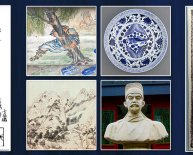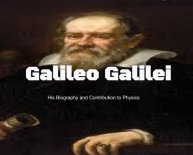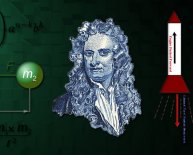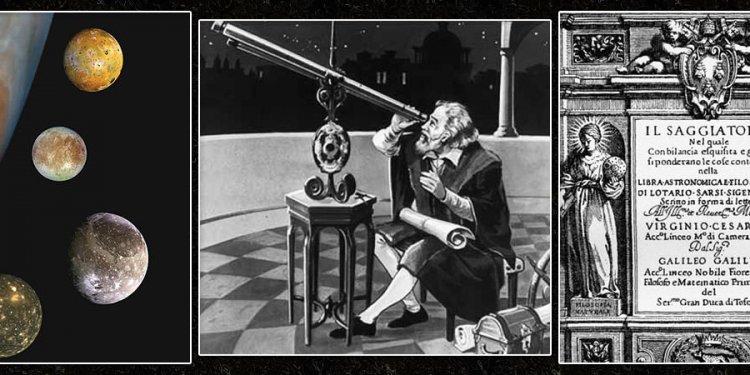
Achievements of Galileo Galilei
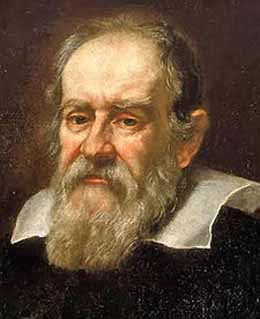 Galileo Galilei
Galileo Galilei
Galileo Galilei was a Italian physicist, mathematician, astronomer, and philosopher who played a major role in the Scientific Revolution. His achievements include improvements to the telescope and consequent astronomical observations, and support for Copernicanism.
Galileo has been called the "father of modern observational astronomy", the "father of modern physics", the "father of science", and "the Father of Modern Science." The motion of uniformly accelerated objects, taught in nearly all high school and introductory college physics courses, was studied by Galileo as the subject of kinematics. His contributions to observational astronomy include the telescopic confirmation of the phases of Venus, the discovery of the four largest satellites of Jupiter, named the Galilean moons in his honour, and the observation and analysis of sunspots. Galileo also worked in applied science and technology, improving compass design.
Galileo's championing of Copernicanism was controversial within his lifetime. The geocentric view had been dominant since the time of Aristotle, and the controversy engendered by Galileo's presentation of heliocentrism as proven fact resulted in the Catholic Church's prohibiting its advocacy as empirically proven fact, because it was not empirically proven at the time and was contrary to the literal meaning of Scripture. Galileo was eventually forced to recant his heliocentrism and spent the last years of his life under house arrest on orders of the Roman Inquisition.
His formulation of (circular) inertia, the law of falling bodies, and parabolic trajectories marked the beginning of a fundamental change in the study of motion.
His insistence that the book of nature was written in the language of mathematics changed natural philosophy from a verbal, qualitative account to a mathematical one in which experimentation became a recognized method for discovering the facts of nature.
Finally, his discoveries with the telescope revolutionized astronomy and paved the way for the acceptance of the Copernican heliocentric system, but his advocacy of that system eventually resulted in an Inquisition process against him.
Early Life and Career
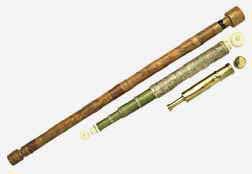 Galileo was born in Pisa, Tuscany, on February 15, 1564, the oldest son of Vincenzo Galilei, a musician who made important contributions to the theory and practice of music and who may have performed some experiments with Galileo in 1588-89 on the relationship between pitch and the tension of strings.
Galileo was born in Pisa, Tuscany, on February 15, 1564, the oldest son of Vincenzo Galilei, a musician who made important contributions to the theory and practice of music and who may have performed some experiments with Galileo in 1588-89 on the relationship between pitch and the tension of strings.
The family moved to Florence in the early 1570s, where the Galilei family had lived for generations. In his middle teens Galileo attended the monastery school at Vallombrosa, near Florence, and then in 1581 matriculated at the University of Pisa, where he was to study medicine.
However, he became enamoured with mathematics and decided to make the mathematical subjects and philosophy his profession, against the protests of his father. Galileo then began to prepare himself to teach Aristotelian philosophy and mathematics, and several of his lectures have survived.
In 1585 Galileo left the university without having obtained a degree, and for several years he gave private lessons in the mathematical subjects in Florence and Siena.
During this period he designed a new form of hydrostatic balance for weighing small quantities and wrote a short treatise, La bilancetta ("The Little Balance"), that circulated in manuscript form.
He also began his studies on motion, which he pursued steadily for the next two decades.
In 1588 Galileo applied for the chair of mathematics at the University of Bologna but was unsuccessful.
His reputation was, however, increasing, and later that year he was asked to deliver two lectures to the Florentine Academy, a prestigious literary group, on the arrangement of the world in Dante's Inferno.
He also found some ingenious theorems on centres of gravity (again, circulated in manuscript) that brought him recognition among mathematicians and the patronage of Guidobaldo del Monte (1545-1607), a nobleman and author of several important works on mechanics.
As a result, he obtained the chair of mathematics at the University of Pisa in 1589.
There, according to his first biographer, Vincenzo Viviani (1622-1703), Galileo demonstrated, by dropping bodies of different weights from the top of the famous Leaning Tower, that the speed of fall of a heavy object is not proportional to its weight, as Aristotle had claimed.
The manuscript tract De motu (On Motion), finished during this period, shows that Galileo was abandoning Aristotelian notions about motion and was instead taking an Archimedean approach to the problem.
But his attacks on Aristotle made him unpopular with his colleagues, and in 1592 his contract was not renewed.
His patrons, however, secured him the chair of mathematics at the University of Padua, where he taught from 1592 until 1610.
Although Galileo's salary was considerably higher there, his responsibilities as the head of the family (his father had died in 1591) meant that he was chronically pressed for money.
His university salary could not cover all his expenses, and he therefore took in well-to-do boarding students whom he tutored privately in such subjects as fortification.
He also sold a proportional compass, or sector, of his own devising, made by an artisan whom he employed in his house. Perhaps because of these financial problems, he did not marry, but he did have an arrangement with a Venetian woman, Marina Gamba, who bore him two daughters and a son.
In the midst of his busy life he continued his research on motion, and by 1609 he had determined that the distance fallen by a body is proportional to the square of the elapsed time (the law of falling bodies) and that the trajectory of a projectile is a parabola, both conclusions that contradicted Aristotelian physics.
Telescope Discoveries
At this point, however, Galileo's career took a dramatic turn.
In the spring of 1609 he heard that in the Netherlands an instrument had been invented that showed distant things as though they were nearby.
london population since 1900 london before ww1 london around areas london up and coming areas london via rail beyond london london pro und contra london west hollywood london population 2021 london front of house next london areas to be gentrified london visa london elise kress hotel in front of london eye london bridge arizona london airport london broil recipe london broil marinade london drive thru covid vaccine london to paris train london like names fallen london beneath the neath london pool between buildings london fog latte since london is north of paris london past and present ks1 london quireboys london without fuel london without water bridge beside london eye london outdoor afternoon tea london for men burberry london against c5 london as a boy name london as atlantic port city london evening standard london by edward rutherfurd since london is north of paris london dry gin london last names london evening standard crossword london outdoor theatre around london in 40 steps london but me what is london next to london among us london is made up of two cities p london ig london of tower london with family london england about london in english london hotel next to harrods london ky zip code until london london versus sydney london inside out london outdoor food market london of liberty fabric london ky london covid restrictions london with kids london postal codes london on da track age london city london nfl games london like home london as a first name london airport code london lazerson movies london vs paris london via rail schedule london brown beyond london agency london without water
